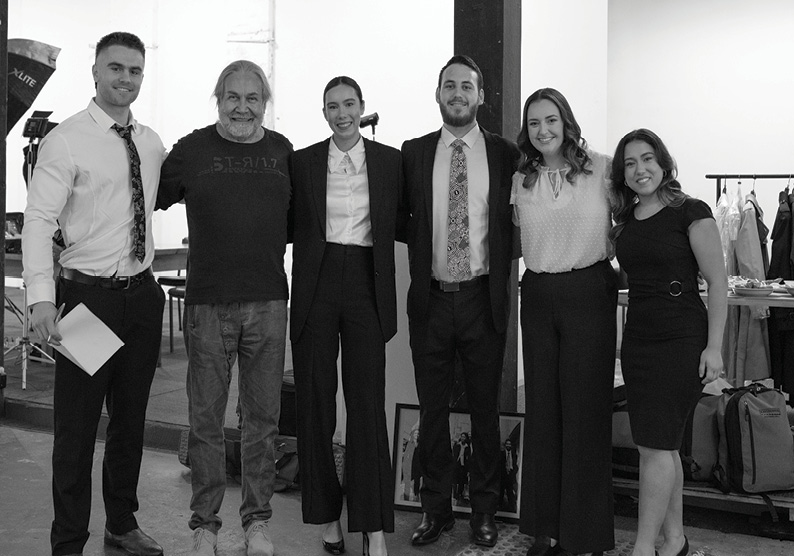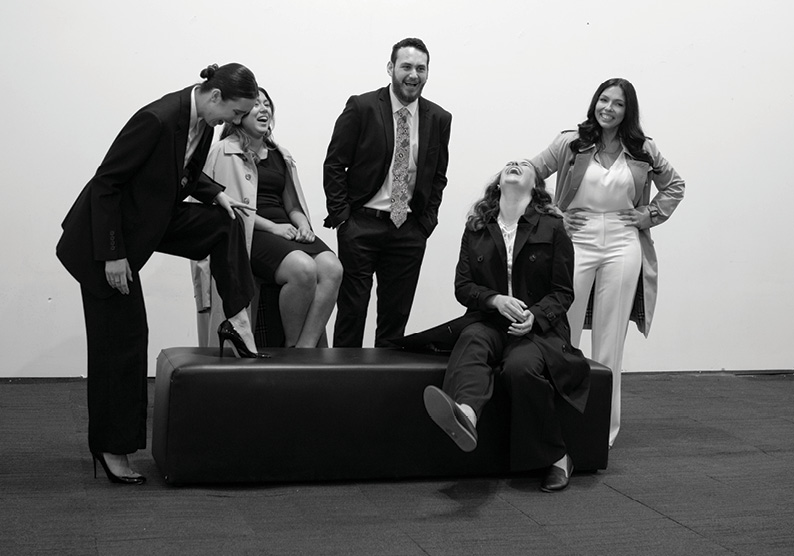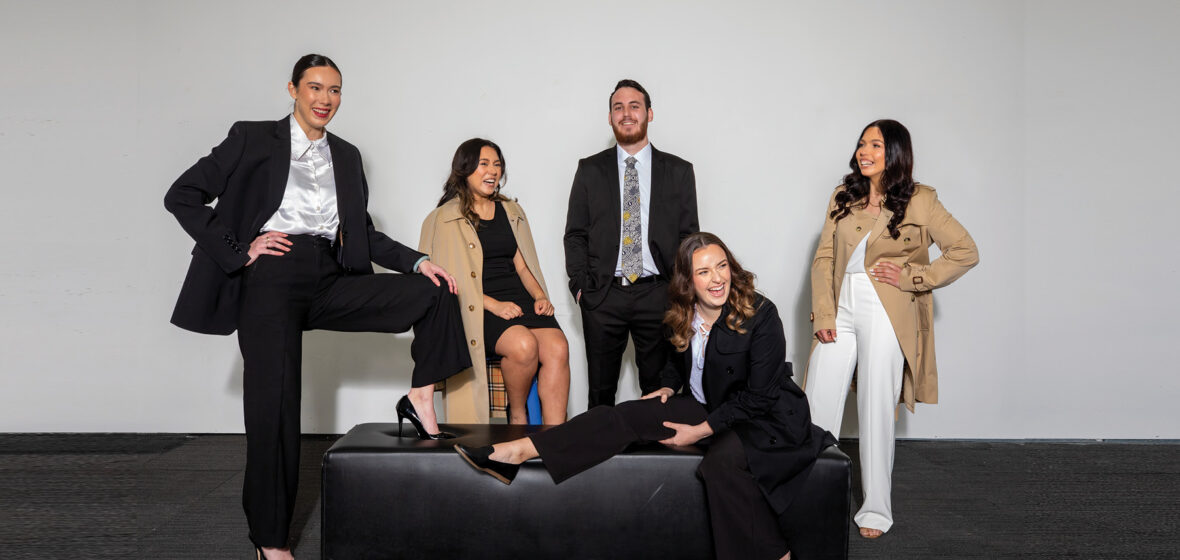“Oh what a lovely precious dream, to be young, gifted and black,” sang Nina Simone. Meet the proud Indigenous law students and graduates taking it all in their stride.
Amanda Morgan, Kyle Fox, Jess Oehm, Karla Jeffrey and Irene Higgins are five Indigenous law students and recent graduates committed to making change through the legal profession. On the day of Ngalaya’s 25th anniversary celebration, the ambitious future leaders came together and met their mentors and heroes: Aunty Dr Terri, Uncle Damien, Uncle Kevin and Uncle Tony. The next generation agreed their path into law is very different now from the one those deadly legal professionals had to follow. But in other ways, it’s very much the same.
Ngalaya has lived up to its promise of enabling Indigenous people in the legal field to support each other. As Uncle Kevin told me, “Ngalaya encourages Indigenous mentors for Indigenous people and avoids white people teaching about Blackfella struggles and engaging in that which is not their true experience”.
Throughout NSW, alternative entry programs are in place for Indigenous students wanting to study law. The young people in this article credit these structures for helping them to access law studies and supporting them on their journeys.
Both Kyle and Karla came through UNSW’s Indigenous Pre-law program, which offers either an alternative entry pathway to university or a degree-specific preparatory program.
Likewise at Western Sydney University, Jess was supported by the Badanami Centre for Indigenous Education. Here the Aboriginal and Torres Strait Islander Pathway Program is an alternative entry pathway for people who are either working, unemployed, studying at TAFE, or coming straight from high school. For Jess, the Centre is a refuge from the twin stresses of working and studying full time. “It’s just amazing to be here surrounded by other Indigenous people who are going through the same thing,” she says.
Indigenous recent school leavers (with or without an ATAR), non-school leavers, and people with TAFE, College or previous university qualifications also have the University of Technology Sydney’s Jumbunna Pathways Program as an option. It considers holistic factors, including education and previous life and work experience.
Encouragingly, the programs don’t stop there. At the University of Wollongong, the Indigenous Admission Program is an alternative pathway for Indigenous people over the age of 17 to enter the university’s undergraduate programs. Students with or without ATARs, or without the required ATAR for their preferred course, as well as mature-age students, can all apply.
Sydney University’s Gadigal Program offers young Indigenous people the chance to apply for an early offer, in Year 12 or after high school. And at Macquarie University, the Aboriginal & Torres Strait Islander Pathway gives access to undergraduate courses, determines readiness for study and offers advice on alternative opportunities. It’s for students who needing peace of mind from an early offer, haven’t completed their HSC or equivalent, have a lower ATAR than needed for their degree, or are mature age.
Slowly the broader legal profession is realising the importance of cadetships for promoting reconciliation, participation by the Indigenous community, and cultural diversity. The students praise opportunities already in place with the public defender’s office, Gilbert + Tobin, and the new Community Legal Centres NSW Cadetship program facilitated by Bobbi Murray.

Barriers along the way
For all five students and myself, there were common barriers to studying law. It wasn’t easy to start legal studies at university, and it was challenging to engage fully in classes once we were studying.
Fitting into law school with people from different backgrounds was isolating, and imposter syndrome was a real experience. We felt out of place in a setting that places a premium on high marks and highly connected social networks. “We have a lot of doubts about whether or not we belong. I definitely did … we grow up with this idea of a lawyer in a big corporate office, and this idea that lawyers come from private schools and a certain background,” Karla says.
Most of us are from working class families. Some of us grew up in rural or remote areas; and in some of our families the past generations were removed. Most of us are the first of our siblings and cousins, many generations back, to go to university. Some are the first in family to graduate high school.
My ngabun (pop) told me that he’s keen to tell everyone when I graduate. “Take every opportunity you possibly can,” he says, “because back in the day I had to fight to get out of the Boys’ Home to see my family, or even to sit on the ‘white’ side of the pub and picture theatre”.
These issues are compounded by the financial and geographical challenges most Indigenous law students also experience. “We’ve had to move away from home, move off-country, to start studying. That in itself is a huge challenge. Most of us have to support ourselves completely. You have to work to be able to pay rent in Sydney, and you don’t have time to connect back with your country and your family,” Karla says.
Even if some of us come from a less socioeconomically disadvantaged background, what we all have in common is the struggle for a sense of identity and the constant questioning about what “world” we fit into. We all carry the intergenerational trauma associated with the way the legal system was imposed on us. We all carry the trauma of witnessing fellow Indigenous people being oppressed and treated poorly by the legal system.
The ATAR system is another hurdle, particularly as students from private schools can be “scaled” higher due to their schools’ ranking and collective score. This deters people from studying law, and places an increased emphasis on the need for support so we can foster our common passion to make a difference for our community. However, us mob are often high achievers at school and achieve high ATARs. Kyle, for example, graduated as the first Indigenous dux from his high school.
But the general sense that we are out of place has at times deterred us from attending university classes, talking to certain peers and listening when certain concepts are taught.
We recognise that these are ongoing issues for all Indigenous people, and we are keen to overcome these negative common experiences, stereotypes, and the sense of cultural inappropriateness by making a difference and sharing our voice. Jess speaks for us all when she says, “We are willing to put in the effort to get there”.
Breaking down barriers
“I just want to be the best lawyer I can be for our mob,” Kyle says.
The High Distinction Criminology and Criminal Justice Law Student received Ngalaya’s First Nations Senior Law Student of the Year award in 2022. “We’re just keen on giving back to our community. That’s why we work so hard. No one of us is ever going to forget why we do it,” he says.
“I feel as if having an Indigenous lawyer breaks down a lot of barriers. Automatically, you have some sort of common ground, and you can relate to some of the experiences that people may have faced or continue to face.
“And you can learn their story.”
Amanda wears many hats. The Bachelor of Law and Bachelor of Psychology student at Macquarie University is the Project Manager of the Accelerating Development of the Aboriginal Legal Services Workplace project. “I am collaborating between Macquarie University, TAFE NSW and Legal Aid NSW to foster a positive journey and stories for First Nations law students,” she says.
Additionally, as a recipient of the Churchill Fellowship 2022, Amanda sees herself supporting Indigenous women who experience sexual harassment.
“Indigenous women don’t feel welcome or safe to report sexual harassment for fear of being victim-blamed by colleagues who already resent us because they think our jobs were handed to us, while they had to work for theirs,” she says.
“The system is set up for failure, it’s set up for us to fail [and] it’s almost like we have to overperform in our successes for them to mean anything.”
Advocacy is high on the list for Wiradjuri woman Irene, a paralegal at personal injury firm North Star Law. She envisions a world that “acknowledges the ways that law disproportionately affects Indigenous peoples”.
“I want to develop a sophisticated understanding of black letter law so that I can better advocate for Indigenous issues. I currently work in institutional abuse claims and it’s important to look at the compensation system we currently have and ask: ‘How can we make it better? How is the idea of Blackfella quantum being embedded within the law?’ The compensation that the Australian law model provides doesn’t adequately address the intergenerational pain that our people suffer. I see the potential for compensation to bring about really positive change for community in the future, and I am reminded of that in my work every day.”
Similarly, in intellectual property, Karla notes “there’s still so much that needs to be done”.
“I don’t believe that Indigenous IP rights and cultural rights are adequately protected yet,” she adds. “So there’s still a lot more work to do there. Terri Janke has completely changed the space, and things are better. But you still hear stories every day about how people are being taken advantage of, and don’t know what their rights are. I just don’t think that’s okay. Indigenous IP and cultural rights are so important. They need to be adequately protected. People need to be protected, to be taught what their rights actually are.”
Karla is part of current action to increase the number of young Indigenous people in the legal profession. “I’m working on a survey with Jason O’Neil, Director of Indigenous Legal Education at UNSW, to ascertain from current and past Indigenous law students why the number of Indigenous law students has decreased, and how we can address this.”

Beyond the Indigenous community
Supporting and protecting the Indigenous community is not the young people’s sole focus; they also have a passion to stand up for the non-Indigenous fellas who are taken advantage of. No one deserves rough treatment under the law.
“Employment law is an area that needs attention. Many of the crimes we have in society are necessity crimes: they stem from a need rather than criminal conduct. Many cases of larceny come from a need to survive. If we can get more working-class people into jobs that are well paying, with good work conditions, we will see the criminal rates significantly reduce in society. On top of that, the community needs people in their corner, to go to bat for them in employment law,” Jess says.
Amanda is keen to be part of a program to eradicate the single focus on the ATAR for university entry. “Universities and educational institutions are not assessing someone based on a specific academic skill set. Currently in the HSC there is no room for neurodiversity. Many people’s minds and passions don’t conform to things like tests, written in pen on paper. We currently have only one particular standard … I want to work on creating alternatives.”
Kyle is passionate about the need to participate in reforming the criminal justice system. “A narrow approach to criminal behaviour ignores that the alleged offender may have been living in poverty, experiencing violence in the home or unable to afford to feed his or her family. Whilst these factors may not excuse criminal offending, they definitely reduce moral culpability. And it is vital, if a system is to achieve justice, that those factors are raised before the courts and dealt with properly. I want to be a part of that process.”
Ultimately, we all, lawyers and law students alike, want reconciliation and better outcomes for our community and society. Collectively, we will work to empower our community in our own time and the generations that follow. And carry our culture forward for generations to come.
Always was, always will be Aboriginal Land.





